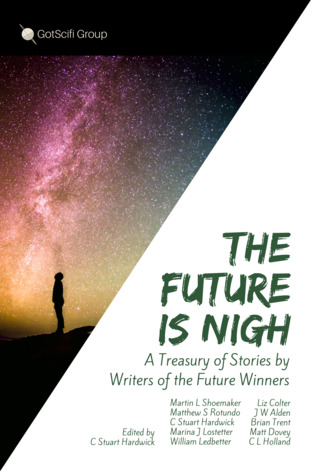For his new anthology C. Stuart Hardwick has collected
stories by winners of the Writers of the Future contest. As a winner of the
contest himself, he is well-aware of the prestige that goes along with the award.
Each of these writers earned their place on the winner’s stage through the
merits of their writing and their vision; there’s no other way to do it. This
is well-demonstrated in the anthology. The collection of stories is diverse,
and will make a good feast for those whose spec-fic tastes are eclectic. The
stories Hardwick has chosen include some of the softest sci-fi you’ll ever
read, but also much more precise and technical tales, and in between are
stories that are adventurous, thoughtful, artistic and literary.
The collection opens with “Sparg,” by Brian Trent, a
cute/sad short story about the tenacity of a family’s highly intelligent
octopus-like pet, told from Sparg’s own experiences. This gives the story’s
language a simplicity that is reminiscent of a children’s book, which makes a
good framework for Trent to surprise the reader.
Also included is Marina J. Lostetter’s “Rats Will Run,” a
classic that draws on the best tropes from the golden age. It’s an adventure
about science gone wrong, exploration on a deadly alien planet, and ancient
alien secrets waiting to be found. It’s comfortable territory for sci-fi fans;
that’s one of its virtues. Our protagonist, Gabby, is the kind of hero we love to
cheer on: a scientist in the thick of alien wilds on the deadly world of
Cit-Bolon-Tum, where the stakes are just right.
Other stories are more challenging. “Möbius” by J.W. Alden
is a brief tale that doesn’t spend its time on technical descriptions of the
technology that the plot depends upon. It’s a sound choice, since by now we’re
all pre-sold on time travel. Instead, the story cuts straight to the human tragedy,
playing in the depth of the mortal psyche and dragging readers in with it. This
will be a familiar territory to readers familiar with the classics, but it won’t
be comfortable.
Hardwick’s own, “Dreams of the Rocket Man,” a story originally
published in Analog and a finalist for the Jim Baen Memorial Award, is also
featured in this collection. If you haven’t read it elsewhere, this is a great
opportunity to do so. Rare are the stories that lean more on science fact that
science fiction, and provide such vicarious fulfillment to the reader. What
sci-fi reader can’t identify with a child’s desire to launch a rocket as high
as possible? This portrayal of human growth cuts to the heart of why many of us
love science so much in the first place, and being reminded of that is worth
the cover-price on its own.
In addition to those, the collection features six more
stories wherein the chosen WotF winners show off their best. This collection is
polished and smooth, featuring some of the better one-sitting reads I’ve seen
in the past few years. As a reader of anthologies, I’ve gotten in the habit of
forgiving one or two stories for being just
okay, but there’s nothing to forgive here. Every story in the collection
knew exactly what it was doing and how to go about it, some of them so well
that they left me mystified.
